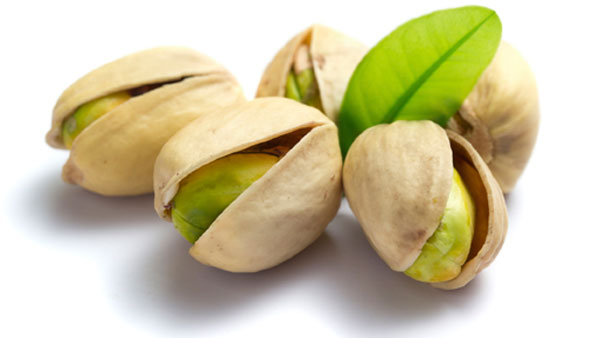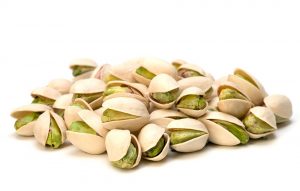
 What are Pistachios?
What are Pistachios?
Similar to mangoes, the pistachio is a member of the cashew family. Although now grown in California, it originates from the Middle East and is native to Syria, Iran, Lebanon, Turkey and the Caucausus Mountains (southern Afghanistan and Russia). It’s the seed of a very hardy tree that grows in dry, stoney, nutrient-poor soil under a hot sun. Despite that, it’s very rich in nutrients and known for its benefits to the heart.
Under the Spotlight
The pistachio is rich in both macro- and micro-nutrients:
- Rich in healthy mono- (50%) and poly-unsaturated fats (20%)
- An excellent source of fibre and protein
- High in the amino acid arginine
- Loaded with B vitamins (B6, B1 and B3 especially, but also B2 and B5)
- Vitamin E makes up a good part of your daily intake (serving size 30g or 47 pistachios)
- Mineral-rich, you’ll find copper, manganese, molybdenum, magnesium, zinc, calcium and selenium
- For nuts, they have the richest source of potassium and 2 servings have more than a medium banana
- Contains oleanolic acid
Benefits to Your Health
Like other nuts, the pistachio is very good for heart health and weight loss:
- Arginine improves blood flow and fluidity and lowers the risk of blood clots by raising nitric oxide levels*
- Potassium and magnesium help keep blood pressure low
- The fats and fibre in pistachios make you feel fuller longer and the arginine helps regulate the hormone insulin (the hormone that tells your body to store glucose as fat – especially around the middle)
- The fats in nuts help protect against type 2 diabetes by improving the structure of your cells so they can better use insulin
- Additionally, people who at pistachios for 3 weeks, had a significan decrease in their LDL (unhealthy) cholesterol levels
- Arginine also helps with immune function, wound healing and detoxification
- The anti-inflammatory effects of oleanolic acid may alleviate itchy dermatitis
- In rat studies, elevated liver enzymes were reduced
- Energy production and stress management rely on B vitamins, specifically B5
Start Now!
- Choose raw (not roasted) pistachios in the shell where the shells are slightly opened; this is because the seed has grown so big it opens them. These nuts will be fresher and tastier.
- Keep a bag of pistachios in your drawer at work (or the fridge to maintain the oils, and taste, longer)
- Have a small airtight bag or container of nuts in your purse or backpack for a post-run snack or afternoon energy dip as these will keep you from reaching for unhealthy snacks
- Stuff fruit (like dates) or cheese with pistachios for a healthier dessert
- Add pistachios to quinoa, rice, barley or millet after cooking for some beautiful colour and extra flavour
- Try this delicious soup
*If you suffer from herpes sores then it’s best to avoid arginine foods like pistachios during a flareup and it may help to prevent flareups to avoid these foods generally. Focus instead on foods that contain lysine.
Recipe Challenge
Join our Recipe Challenge and make a recipe from this and the other three Veggies of the Week in this month. We’ll be choosing a recipe randomly and turning it into a video. Find out more here!
Have a look at last week’s Veggie of the Week.


Comment
[…] Have a look at last week’s Veggie of the Week. […]